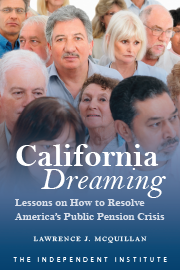Against the backdrop of a national shortage of affordable housing, due in large part to government policies, California lawmakers want to restrict corporate investment in single-family rental properties. This would make the Golden State’s housing affordability crisis worse. Since California is often a bellwether for both federal and other states’ policies, renters should hope the flawed idea dies before it spreads.
One California proposal, Assembly Bill 2584, recently introduced by San Jose Democrat Alex Lee, would establish a quota system, banning “institutional investors that own more than 1,000 single-family homes from purchasing additional properties and converting them into rentals.” A second proposal, Senate Bill 1212, introduced by Berkeley Democrat Nancy Skinner, would prevent hedge funds and “other corporate investment entities” from buying single-family homes in California, starting next year.
Both lawmakers claim that deep-pocketed institutional investors, such as private-equity firms, hedge funds and real-estate investment trusts, buy so many single-family homes that first-time and low-income home buyers are priced out of the market. This claim shows how little these California lawmakers understand about the role most institutional investors play in the housing market.
The anticorporate housing crusaders overestimate the influence of institutional investors. According to the nonpartisan California Research Bureau, large institutional landlords own less than 2% of all single-family homes in the Golden State: 60,500 units statewide. Nationally, institutional investors owned only 5% of America’s 14 million single-family rentals in 2022, or approximately 700,000 units, according to MetLife Investment Management. Corporate investors don’t control a large enough share of the housing in any market either to dictate rental prices or to squeeze out desperate home buyers.
Despite their relatively small scale, however, corporate landlords are valuable niche participants in housing markets because they often purchase neglected properties and make them livable again. As Urban Institute researchers have noted, institutional investors can buy distressed homes in bulk, upgrade them and rent them out. Their lower investment costs and specialized expertise allow corporate landlords to make necessary repairs efficiently and economically—realizing economies of scale—expanding the supply of urgently needed move-in-ready rental homes.
The restrictions championed by Mr. Lee and Ms. Skinner would exclude these investors, exacerbating the shortage of affordable, single-family rental houses. Redfin reports that investors spend more than $100 billion nationally each year to buy and rehabilitate single-family homes. The solution to the housing shortage is more investment, not less.
California lawmakers have passed more than 100 laws to spur the construction of additional housing since 2017, yet they have failed to produce the promised construction boom that would drive down home prices. Many of the new laws have done the opposite, undermining the professed goals of affordable-housing champions.
Through their decisions and actions, institutional investors have been telling lawmakers that the way to ameliorate the affordable-housing crisis is to eliminate burdensome restrictions on home building and rehabilitation of existing properties, and to strengthen private-property rights.
Progressive California politicians say they want to restrict corporate investment in single-family rental markets because they think doing so would help everyday renters and home buyers. Instead, their proposals would force financial capital out, reduce the future stock of rental housing and increase rental prices. That isn’t an idea California should export.










